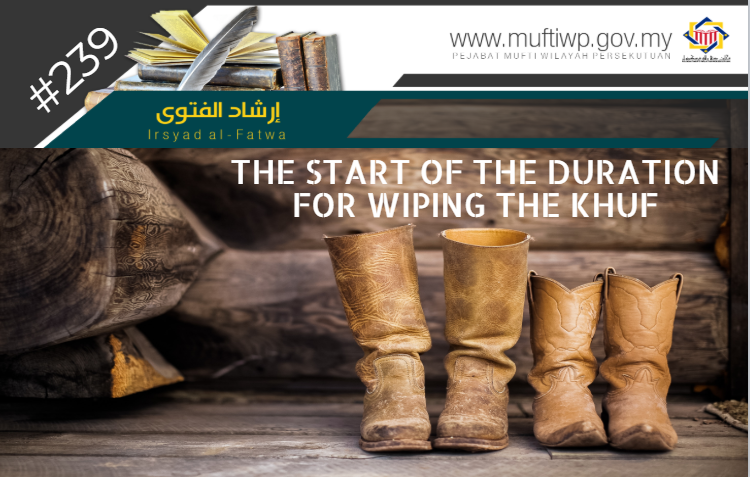
Question:
When is the start of the duration for wiping of the khuf? And if someone is doubtful as to when he wiped the khuf, whether it was when he was travelling or when he was residing, what should he do?
Answer:
Alhamdulillah, praise and thanks to Allah for the countless blessings He has blessed us all with. Blessings and salutations to the Prophet Muhammad PBUH, his wives, his family, companions and all those that follow his teachings to the day of judgement.
We will start with the meaning of khuf and the ruling of wiping the khuf.
Definition of Khuf
Khuf is a type of leather shoes that covers the ankles. Ankles are the protruding area where two bones are connected, between the foot and the leg.
The Ruling of Wiping Khuf
Wiping khuf is a form of facilitation (رخصَةٌ) that is permitted for both man or woman in all situations, may it be in summer or winter, travelling or residing, healthy or sick. This act is a replacement of washing the feet during ablution. (See al-Fiqh al-Manhaji, 1/241)
According to majority of the scholars’ opinion, the duration set to wipe the khuf starts when hadas happens after wearing khuf until the same time the second day for resident and four days for travellers, for the time it is obliged to wipe the khuf again starts when hadas happens. Thus, the duration starts from that moment.
It is analogicall deduced (qiyas) to prayer, where the time starts when it has to be performed. In addition, there is a hadith from Safwan bin Assal, he states:
أَمَرَنَا أَنْ نَمْسَحَ عَلَى الْخُفَّيْنِ إِذَا نَحْنُ أَدْخَلْنَاهُمَا عَلَى طُهْرٍ ثَلاَثًا إِذَا سَافَرْنَا ، وَيَوْمًا وَلَيْلَةً إِذَا أَقَمْنَا ، وَلاَ نَخْلَعَهُمَا مِنْ غَائِطٍ وَلاَ بَوْلٍ وَلاَ نَوْمٍ ، وَلاَ نَخْلَعَهُمَا إِلاَّ مِنْ جَنَابَةٍ.
“The Prophet PBUH used to order us to wipe both the khuf when we are wearing them in pure and clean state for three days and nights except for when we are travelling and one day and night for when we are residing. We do not remove our Khuf except from sexual impurity, but not from defecation, urination, and sleep.”
Sunan Ahmad (18093)
This means, the khuf needs to be removed three days after defecation. Khuf prevents the hadas from reaching to the feet. Thus, the starting time is considered from the time it (the khuf) prevented the hadas, or the time of hadas prevented from reaching the feet.
According to this, whoever takes his ablution starting at the rise of dawn, then he wears the khuf and after sunrise he experienced hadas, then after the sun has passed its zenith he takes his ablution by wiping his khuf, then:
- If he is residing, he has to wipe his khuf the same time he removed his hadas the next day, which is when the sun has passed its zenith on the second day.
- If he is travelling, then he can wipe his khuf until the sun has passed its zenith on the fourth day.
When a resident wipes his khuf, then he went on a travel or vice versa; in which he was travelling then he resides somewhere, then:
- According to Syafie and Hanbali scholars, the duration is counted as if one is a resident, for a priority is given to that situation for it is his original situation. For both situations stated, he can only wipe his khuf for one day and one night.
- According to Hanafi scholars, if someone wipes his khuf when he was residing, then he travels, he can wipe his khuf for the duration set for a traveller, which is three days and three nights, for he is a traveller. If he is travelling then stops somewhere, if he completes the duration as a residence, then it is obligatory for him to remove his khuf for the facilitation for traveller is no longer applicable to him. If he does not complete the duration, then he can continue as a traveller.
If he’s confused as to when he started to wipe his khuf, whether when he was traveling or residing, then:
- According to Hanbali scholars, he has to refer to something that is certain, which is wiping as a resident, for someone should not wipe his khuf when he is unsure.
- Syafie scholars state, if someone is unsure whether the duration has ended or not, he is not permitted to wipe his khuf, and it does not matter whether the duration has ended or not. The same goes for travellers that is insure if he wipes his khuf when he was residing or travelling, for wiping of khuf is a facilitation or rukhsah with conditions that includes time. Thus, when one is in doubt, he has to return back to the original ruling, which is the obligatory washing of the feet for ablution. [1]
May Allah SWT give us understanding on His religion which ease human beings and protect their maslahat.
End note:
[1] Refer al-Fiqh al-Islamiy wa Adillatuh, 1/312-313.

